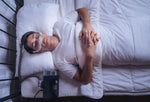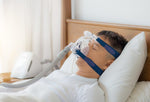On This Page
Can You Die From Sleep Apnea?
Our editorial process includes extensive measures to verify accuracy, provide clarity on complex topics, and present factual information. Read more
Key Takeaways
- Though sleep apnea in and of itself doesn't lead to death, untreated sleep apnea can increase the risk of serious health complications and shorten a person’s lifespan.
- Conditions such as cardiovascular disease and type 2 diabetes, which are linked to sleep apnea, can lead to premature death.
- In rare instances, untreated or severe OSA can increase the likelihood of arrhythmias and sudden cardiac death (SCD).
Complications From Untreated Sleep Apnea
Untreated obstructive sleep apnea (OSA) can lead to a variety of health complications ranging from changes in mood, thinking, and memory to chronic health conditions like hypertension, diabetes, liver disease, and heart problems.
- Accidents: Daytime drowsiness and inattention from sleep apnea can double or even triple the risk of accidents, including car crashes and workplace incidents.
- Cardiovascular disease: A range of heart health problems can arise if obstructive sleep apnea goes undiagnosed and untreated. Examples of cardiovascular issues linked to sleep apnea include high blood pressure, abnormal heart rhythm, heart failure, heart attack, and stroke. Some evidence also suggests that OSA heightens the risk of blood clots.
- Type II diabetes: Type 2 diabetes involves persistently high blood sugar levels, and it is more likely to occur in people with obstructive sleep apnea. Potential health complications of type 2 diabetes include kidney and heart conditions as well as problems with the eyes and feet.
- Liver disease: Individuals with untreated OSA are as much as three times more likely to develop a condition called nonalcoholic fatty liver disease, which can damage the liver and contribute to other serious health issues.
- Pulmonary hypertension: Between 20% and 30% of people with moderate to severe OSA have pulmonary hypertension, a condition that leads to reduced blood flow to the heart and heart damage.
- Changes in memory and thinking: Untreated OSA can impair thinking, including memory and decision-making. This can lead to poorer performance at work or in school.
- Disrupted mood and emotions: Disrupted sleep from OSA is linked to irritability and other mood changes, including a higher risk of depression. Having OSA is also associated with anxiety.
- Kidney disease: OSA that goes untreated can worsen the impact of chronic kidney disease.
- Sexual problems: People with untreated OSA are more likely to have reduced libido, and men with OSA are at a higher risk of erectile dysfunction.
- Breathing difficulties: People who have asthma may find it even harder to breathe at night if they also have untreated OSA. Research has also found that, on average, having OSA reduces the lifespan of people with chronic obstructive pulmonary disease (COPD).
- Gout: Untreated OSA is associated with a significant increase in the risk of having gout, a type of arthritis that causes painful inflammation in the joints.
- Cancer: Although more studies are needed, some research has found that cancer is more likely in people whose OSA significantly lowers their oxygen levels during sleep.
These conditions have multiple risk factors and are not caused by sleep apnea alone. However, having OSA that goes untreated is linked with a greater risk of these health concerns.
Can You Die in Your Sleep From Obstructive Sleep Apnea?
Obstructive sleep apnea can raise the risk of abnormal electrical activity in the heart called arrhythmias. Though rare, untreated or severe OSA can increase the likelihood of arrhythmias and sudden cardiac death (SCD). Having a chronic heart condition, severe OSA, and being over 60 further heightens this risk.
Risk of Death From Central Sleep Apnea
Only limited research has investigated how central sleep apnea (CSA) affects the risk of dying. Central sleep apnea is not as common as OSA, affecting less than 1% of the population. CSA occurs because of disruptions in signals between the brain and muscles required for breathing, and it's often associated with an underlying medical condition, such as heart failure.
For people with heart failure, having CSA is associated with a higher risk of mortality. CSA can also affect the heart in ways that may increase the risk of dying suddenly during sleep.
People with CSA should talk with their doctor about treatment, which is usually directed at treating the underlying cause. This may help decrease the symptoms of sleep apnea and improve long-term health outcomes.
Signs of Sleep Apnea to Watch Out For
The most common signs of sleep apnea are excessive daytime sleepiness, loud and frequent snoring, and choking sounds during sleep.
- Excessive daytime sleepiness: People with sleep apnea get low-quality sleep, causing daytime drowsiness. This can mean dozing off at unwanted times or a general feeling of low energy or difficulty concentrating.
- Snoring: Most people with OSA snore regularly and loudly. In many cases, it’s a bed partner or family member who recognizes this symptom.
- Choking sounds: People with OSA may sometimes wake up briefly, gasping or choking as their airway reopens during sleep.
Other potential signs of OSA include regular morning headaches, difficulty staying asleep through the night, and frequent nighttime urination.
Risk Factors for Sleep Apnea
Not everyone is equally likely to develop obstructive sleep apnea. Some factors make a person more likely to develop OSA.
The biggest risk factors for OSA include:
- Age: OSA can affect people of any age, but it becomes more common with aging. People who are in their 60s and older are most likely to have OSA.
- Sex: Men are up to three times more likely to have OSA, especially at a younger age.
- Obesity: Studies indicate that the higher a person’s body weight, the higher their chances of developing OSA.
- Certain facial features: The shape of a person’s face and neck influences how well air can move through their airway. For example, people with larger tonsils or a shorter or abnormal jaw are at a greater risk of having OSA.
Other issues may also contribute to the risk of developing sleep apnea, including:
- Use of alcohol or sedatives: Alcohol and sedative medications are believed to relax throat muscles, which can contribute to narrowing of the airway during sleep.
- Nasal congestion: Long-term nasal blockage can make breathing harder at night, increasing the risk of OSA.
- Family history of sleep apnea: Although the exact reason is unclear, studies have found that OSA is more common in people with a family history of the condition.
- Smoking cigarettes: Some research has found that smoking cigarettes may triple the risk of having OSA.
- Having certain medical conditions: OSA is more likely in people who have medical conditions like congestive heart failure, kidney disease, chronic lung problems, obesity hypoventilation syndrome, hyperthyroidism, or nocturnal gastroesophageal reflux disease (GERD).
How Treating Sleep Apnea Lowers Your Risk
Effective treatment reduces or eliminates the risk of most of the potential health complications from sleep apnea. Studies have found that treatment, such as with a CPAP machine, reduces the overall risk of death in people with OSA.
Treatment for OSA focuses on trying to keep the airway open during sleep so that there are few or no lapses in breathing. This enables higher quality sleep and prevents harmful dips in oxygen levels (and rises in carbon dioxide levels).
Multiple treatment options are available, so if you have been diagnosed with sleep apnea, a doctor or sleep specialist can help determine the best treatment approach.
When to Talk to Your Doctor
Sleep is fundamental to your overall health and daytime functioning. Talk with a doctor if you, your bed partner, or your roommate notice any of the following sleep apnea symptoms:
- Frequent or excessive daytime sleepiness
- Very loud snoring or gasping for air during sleep
- Regularly having trouble staying asleep
- Morning headaches almost every day
- Having to go to the bathroom multiple times on most nights
If you find you’re struggling with sleep, it may be useful to keep a sleep diary to track information about your evening routine, medications, and hours of sleep. This can help give your doctor more information about your sleep habits.
In talking with your doctor, you can get insight into whether a sleep study or home sleep test would be helpful to determine if you have sleep apnea and, if so, its severity.










